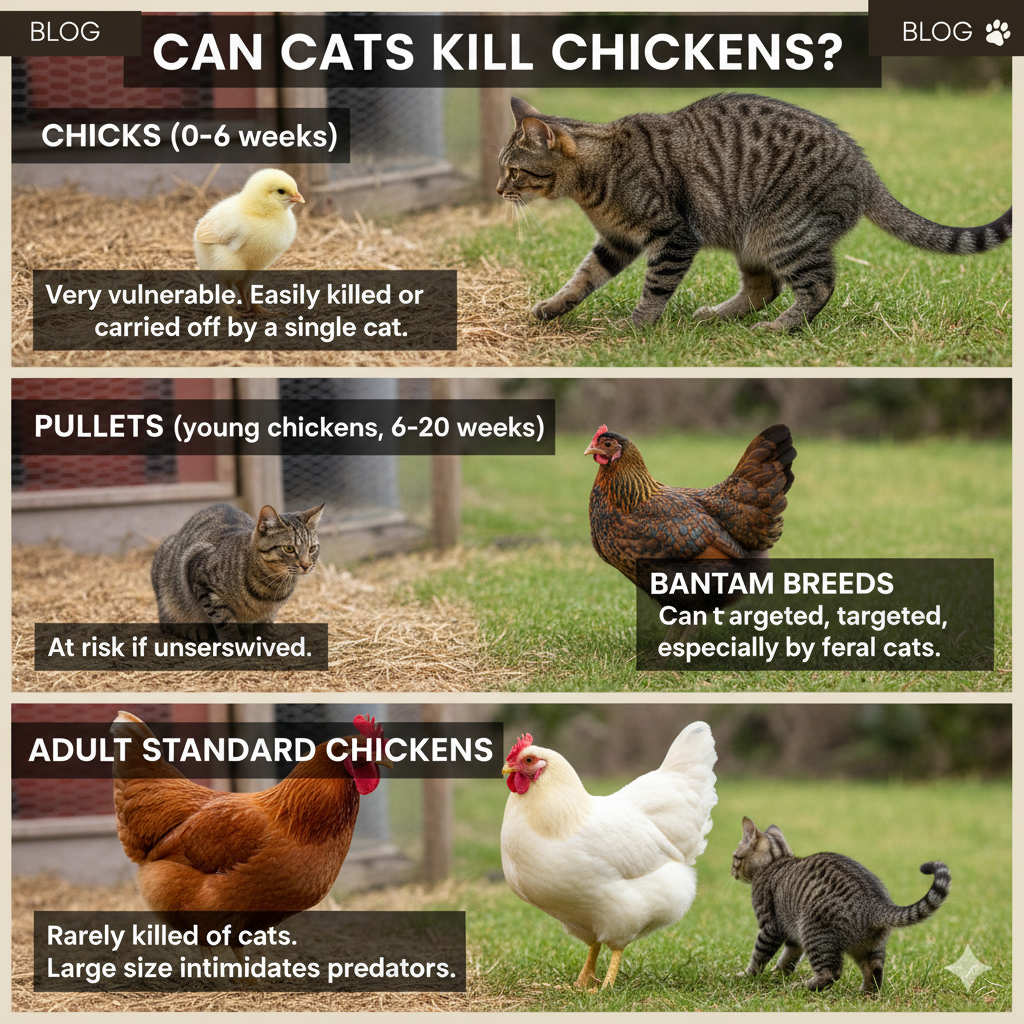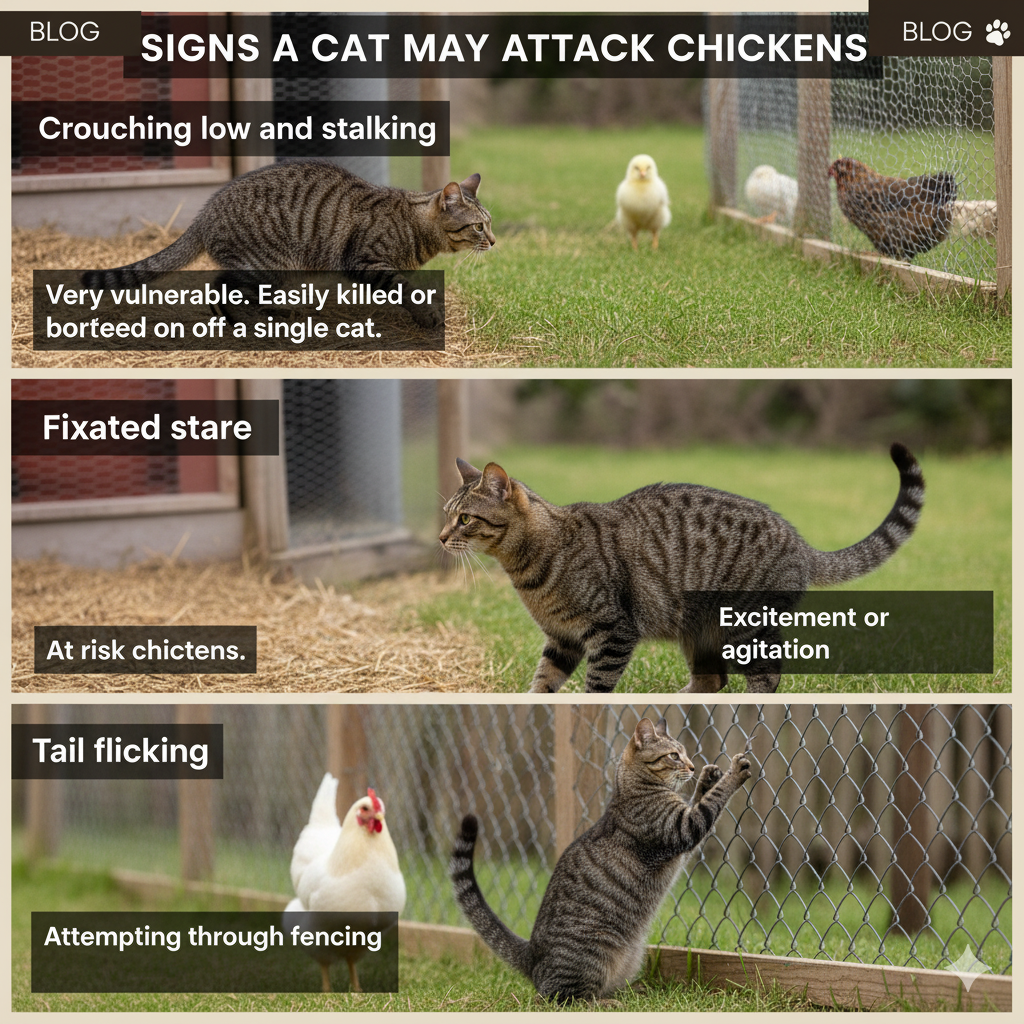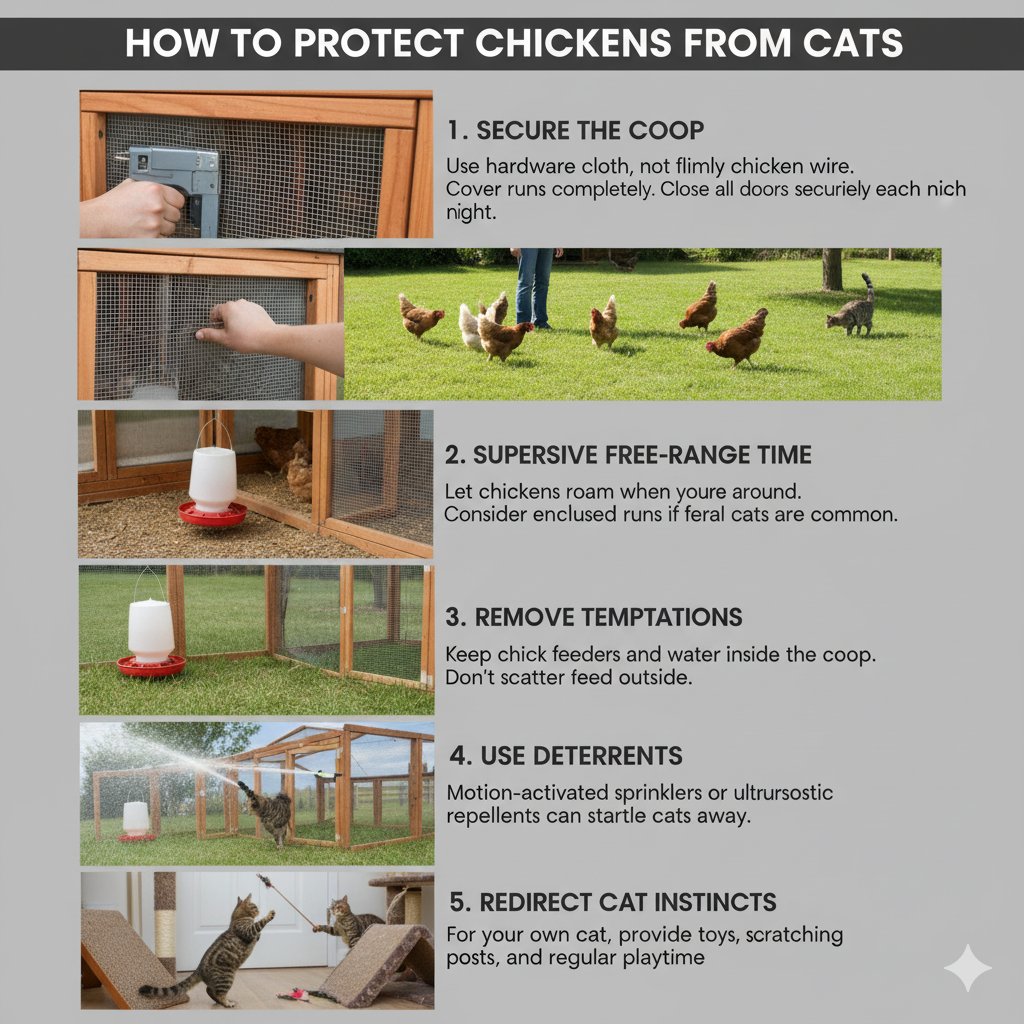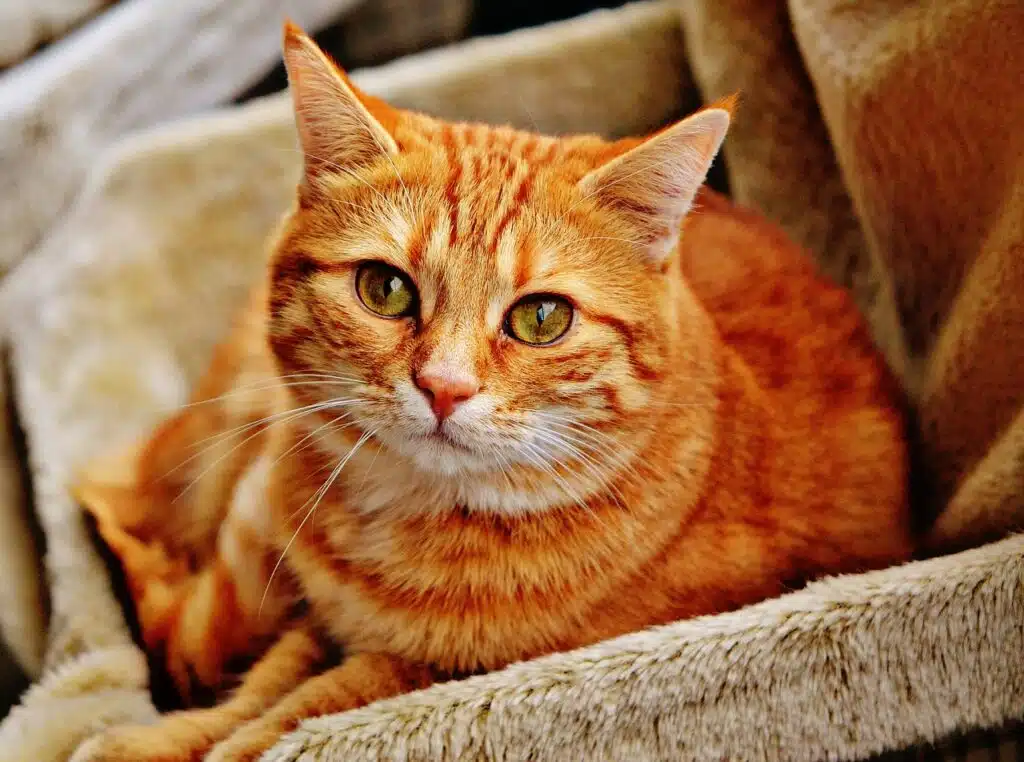Post Disclaimer
Catopedea shares information for educational and general interest purposes only. Our content is not a substitute for professional veterinary advice, diagnosis, or treatment. Always consult a licensed veterinarian for concerns about your cat’s health, diet, or behavior.
Backyard chicken keeping has exploded in popularity over the past decade. Families are building coops, collecting fresh eggs, and enjoying the charm of having hens scratching around the yard. But with chickens come predators – and one question often surprises new chicken keepers:

Can cats kill chickens?
At first, it sounds odd. We usually think of cats as sweet companions, not barnyard hunters. Yet anyone who’s watched a cat stalk a bird or mouse knows their instincts run deep. So when your neighbor’s tabby lurks around your coop, or a feral cat prowls the property line, it’s natural to wonder if your flock is at risk.
The truth? Yes, cats can kill chickens – but not always. The risk depends on the size and age of your chickens, the type of cat involved, and how well your birds are protected. Chicks and small breeds are vulnerable, while most adult standard chickens can hold their own.
In this guide, we’ll break down everything you need to know: why cats sometimes attack chickens, which birds are most at risk, how to protect your flock, and whether cats and chickens can peacefully coexist.
Do Cats Attack Chickens?
Cats are natural hunters. Even if they’re fed premium kibble at home, their instincts drive them to stalk, chase, and pounce. For some cats, the chicken run is just another place to practice those skills.
- House cats usually pose little danger to grown chickens. Many will stalk or swat out of curiosity, but when confronted with a flapping, pecking bird, they often back down.
- Barn cats are more unpredictable. Some are raised around chickens and ignore them completely. Others see smaller birds as fair game, especially chicks.
- Feral cats are the highest risk. They rely on hunting to survive, so a chicken – particularly a young one – looks like dinner, not a playmate.
It’s also important to distinguish between play and predation. A well-fed house cat may chase a chicken the same way it bats at a feather toy. But that “play” can still cause harm. One swipe of claws can injure a bird, and stress alone can be dangerous for chickens.
👉 According to PoultryDVM, cats are occasional predators. They aren’t the biggest threat compared to foxes or raccoons, but they can still be opportunistic hunters.
Can Cats Kill Chickens?

The answer is yes – but with some big caveats.
- Chicks (0-6 weeks old): Very vulnerable. A single cat can easily kill or carry off a chick.
- Pullets (young chickens, 6-20 weeks): Still small and less confident. At risk if unsupervised.
- Bantam breeds: These miniature chickens (often just 1-2 pounds) can be targeted by cats, especially feral ones.
- Adult standard chickens: Rarely killed by cats. Most standard hens weigh 5-8 pounds – large enough to intimidate or injure a cat that gets too close.
Cats typically use speed, sharp claws, and quick bites to kill small prey. Against a full-grown hen, that strategy doesn’t always work. Chickens fight back by pecking, clawing, and flapping wings. Some even chase cats away.
Still, an adult chicken can be injured if a cat swipes at its eyes or face. And in rare cases, determined or feral cats have killed adult hens.
Which Chickens Are Most at Risk?
Not all birds are equal when it comes to cat danger.
- Chicks and pullets: Small, fluffy, and defenseless. Cats can easily carry them off.
- Bantams: Miniature breeds weigh far less than standard chickens, making them tempting targets.
- Sick or injured chickens: Predators, including cats, often pick off weak birds.
- Free-ranging flocks: Birds wandering without supervision are far more exposed than those in secure coops or runs.
On the other hand, large standard breeds like Orpingtons or Rhode Island Reds are usually safe. Their size and confidence deter most cats.
Signs a Cat May Attack Chickens

How do you know if the cat lurking by your coop is a threat or just curious? Watch their body language.
- Crouching low and stalking. Indicates hunting mode.
- Fixated stare. A sign of intense prey drive.
- Tail flicking. Excitement or agitation.
- Pawing through fencing. Attempting to reach chicks.
- Disappearing birds. Missing chicks or sudden feather scatter near the coop.
Playful cats may also pounce and chase without intent to kill, but this still stresses your flock and can cause injury.
How to Protect Chickens From Cats

Cats are clever, but protecting chickens from them is usually straightforward.
1. Secure the Coop
- Use hardware cloth, not chicken wire. Cats (and raccoons) can tear through flimsy wire.
- Cover runs with mesh or netting to prevent climbing or jumping in.
- Close all doors securely each night.
2. Supervise Free-Range Time
Let chickens roam when you’re around. If feral cats are common in your area, consider enclosed runs instead of full free-range.
3. Remove Temptations
Keep chick feeders and water inside the coop. Don’t scatter feed outside where cats can linger.
4. Use Deterrents
Motion-activated sprinklers or ultrasonic repellents can startle cats away from the coop.
5. Redirect Cat Instincts
If it’s your own barn or house cat, provide toys, scratching posts, and regular playtime to satisfy hunting urges.
Cats and Chickens Living Together: Is It Possible?
Surprisingly, yes. Many chicken keepers report their cats and chickens living in harmony.
- Adult chickens intimidate cats. A peck or wing flap often sends even bold cats running.
- Barn cats can be allies. Some chase away rats and mice, indirectly protecting flocks.
- Slow introductions work best. Allow cats and chickens to observe each other safely before direct contact.
However, never assume peaceful coexistence from day one. Chicks should never be left unsupervised with cats. Even if your cat doesn’t intend harm, rough play can be deadly.
What To Do If a Cat Attacks a Chicken
If a cat manages to injure a chicken, act quickly.
- Separate them immediately. Get the chicken to safety.
- Check for wounds. Even small scratches can become infected.
- Clean injuries gently. Use mild antiseptic if available.
- Isolate the chicken. Give them a quiet space to recover.
- Seek veterinary care if wounds are deep or bleeding heavily.
Prevention is key. Once a cat learns chickens are easy prey, they’re more likely to try again. Strengthen your defenses after the first incident.
Other Common Chicken Predators
Cats aren’t the biggest risk your flock faces. In fact, other animals are far more dangerous.
- Dogs: Even playful dogs can kill chickens unintentionally.
- Foxes: Clever, fast, and deadly hunters.
- Raccoons: Infamous for raiding coops, often killing multiple chickens in one night.
- Hawks & owls: Dangerous for free-ranging flocks, swooping in from above.
- Coyotes: Major threats in rural areas.
Compared to these predators, cats are usually a secondary concern. They’re more likely to target chicks than to wipe out a whole flock.
People Also Ask: FAQs
Will a house cat kill a chicken?
Not usually. Adult standard chickens are too large for most house cats, though chicks are at risk.
Do feral cats kill chickens?
Yes, feral cats may hunt chickens for food, especially young or small ones.
Can barn cats be trusted around chickens?
Sometimes. Many barn cats ignore adult chickens, but they may still target chicks.
Do cats attack ducks or other poultry?
Yes, smaller ducks or ducklings can be vulnerable. Adult ducks are less likely to be attacked.
Will cats eat what they kill?
Often no. Cats may kill out of instinct rather than hunger, sometimes leaving the bird uneaten.
Are roosters good protectors against cats?
Yes. Roosters often defend hens aggressively, sometimes chasing cats away.
Why do cats stalk chickens if they don’t eat them?
It’s instinct. Cats are hardwired to chase movement, even if they’re not hungry.
Conclusion: Can Cats Kill Chickens?
So, can cats kill chickens? Yes – but the full answer depends on the circumstances.
- Chicks, pullets, and bantams are the most at risk.
- Adult standard chickens usually stand their ground and deter cats.
- Feral cats pose more danger than pampered house pets.
The good news is that with secure coops, supervised free-range time, and a little prevention, you can keep your flock safe. In some cases, cats and chickens can even coexist – with cats keeping rodent populations down while chickens go about their business.
Backyard farming is about balance. Understanding the risks cats pose allows you to build a safer, happier space for both your pets and your poultry.
👉 Want to keep your flock even safer? Check out our guide on toxic plants and products for cats so you can protect both your chickens and your feline companions.


